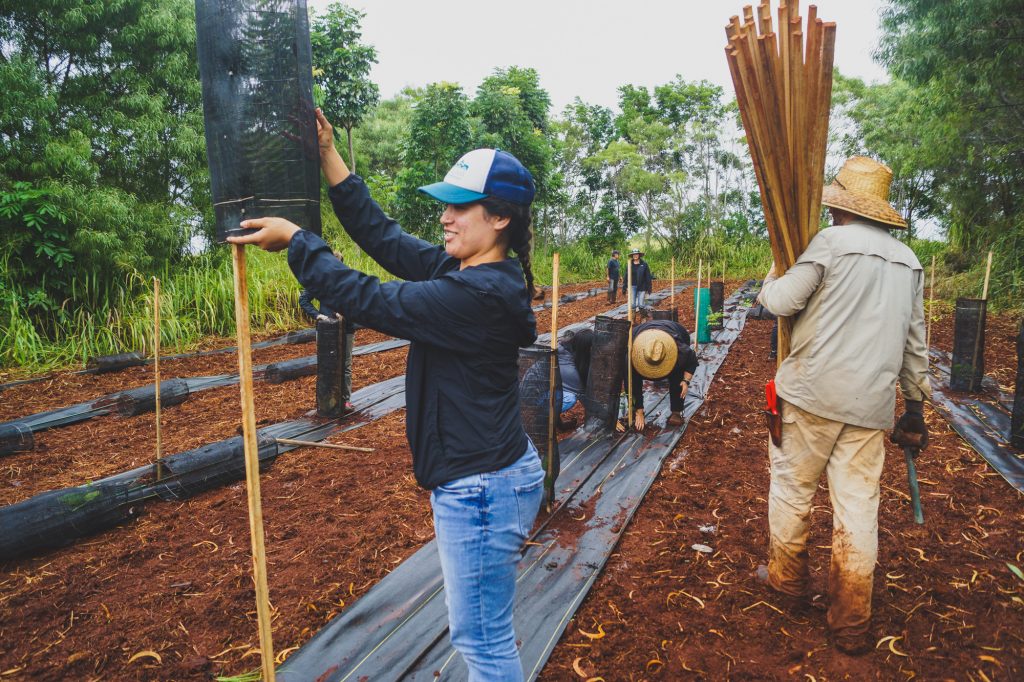Getting Started with Cacao – Webinar

Skill Up!
Getting Started With Cacao
Thursday, June 18th 3:00 pm HST
Pro tips in orchard establishment.
A “How To” and conversation with award-winning growers sharing their key lessons learned, as well as the trials and tribulations of establishing cacao in diverse growing regions, from Hawaiʻi island to Kauaʻi.
This is a two-part event, featuring our newly released video “How To Start a Cacao Orchard in Hawaiʻi”, detailing the materials and best practices to establish a successful orchard. It works best to view the video first and then check out our webinar panel discussion with leading growers working to grow Hawaii’s promising tree-to-bar chocolate industry. The webinar component includes a Q&A session and provide insights into site specific challenges growers have faced during establishment in different regions in Hawaiʻi.
This “Skill-up!” session offers a valuable opportunity to get ahead of the curve and avoid costly mistakes during the start-up phase, relevant to new and prospective growers at any scale.
Webinar – Getting Started with Cacao
Panelists


Susan Bassett
Co-owner of Mauna Kea Cacao
Grows and processes award-winning cacao on her Pepeekeo farm on Hawaii Island. The farm grows 1800 cacao trees aged 1-9 years in a climate averaging 120-140 inches of rain per year. Susan began planting cacao during vacations, then began full-time farming in 2016 after a career as an environmental engineer. A single-estate chocolate bar made from Mauna Kea Cacao beans won the 2018 Good Food Award for chocolate. Cacao from the farm was selected as one of Hawaii’s entries in the 2019 International Cocoa of Excellence Programme.


Seneca Klassen
Founder of Lonohana Estate Chocolate
Prior to beginning Lonohana in 2009, Seneca involved himself with leaders of the artisan chocolate industry worldwide and became part of a new generation of chocolate makers concerned with transparency in the food chain. After creating his own line of bars called Bittersweet Origins and co-founding Bittersweet Cafe, a chain of chocolate cafes in the Bay Area, he followed his dream to start his own estate-grown chocolate company. He continues to lecture throughout the U.S. on both what it takes to start a estate-grown chocolate company and why it’s so important to change the centuries-old business model; has earned multiple awards for his chocolate and continues to play a leading role in helping to establish Hawaii as a world-class origin for cacao and the young chocolate industry that has blossomed since his dream began a reality.


Will Lydgate
Owner of Lydgate Farms
Will Lydgate owns and operates Lydgate Farms on the east side of Kauai. Lydgate raises cacao beans that have been rated top 50 best in the world by the Cocoa of Excellence awards. They also raise award winning vanilla, honey, and other fruits and spices. Will is excited about the future of farm to bar chocolate in Hawaii, the new demand for fine flavor in cacao beans, and the education and fun that come along with teaching customers more about their favorite food — chocolate. Will believes that Hawaii will be a center of innovation in cacao production because of our unique position as the only state in the USA where chocolate can be grown.
Lydgate Farms is known for its successful Ag-tourism operations, as well as educating and selling value added products directly to visitors at the farm. An expert on what not to do when planting cacao, Will will share all the mistakes his family made since making their first plantings in 2002. Will has excellent guidance for growers on seed selection, getting trees out of their teenage years to to bearing fruit, as well as many other helpful tips and tricks.
Moderator


Colin Hart
Farm Manager
Manoa Chocolate Hawaii
Hawaii Chocolate & Cacao Association
Colin Hart was born and raised on Hawaii Island, and helped his family plant their first cacao orchard in 2006 on the Hamakua Coast. He received a Bachelor’s degree in tropical agriculture at UH Hilo in 2016, and his Masters degree at UH Manoa in 2019, where he conducted research on post- harvest processing of cacao. He is currently the farm manager for Manoa Chocolate Hawaii, and is a board member for the Hawaii Chocolate & Cacao Association.
Introduction


Dave Elliott
Executive Director
Oahu RC&D


Maria Carl
President
Hawaii Chocolate & Cacao Association
Co-Owner
21 Degrees Estate
Sponsors




This material is based upon work that is supported by the National Institute of Food and Agriculture, U.S. Department of Agriculture, under award number 2016-38640-25383 through the Western Sustainable Agriculture Research and Education program under subaward number 200592-388. USDA is an equal opportunity employer and service provider.






















